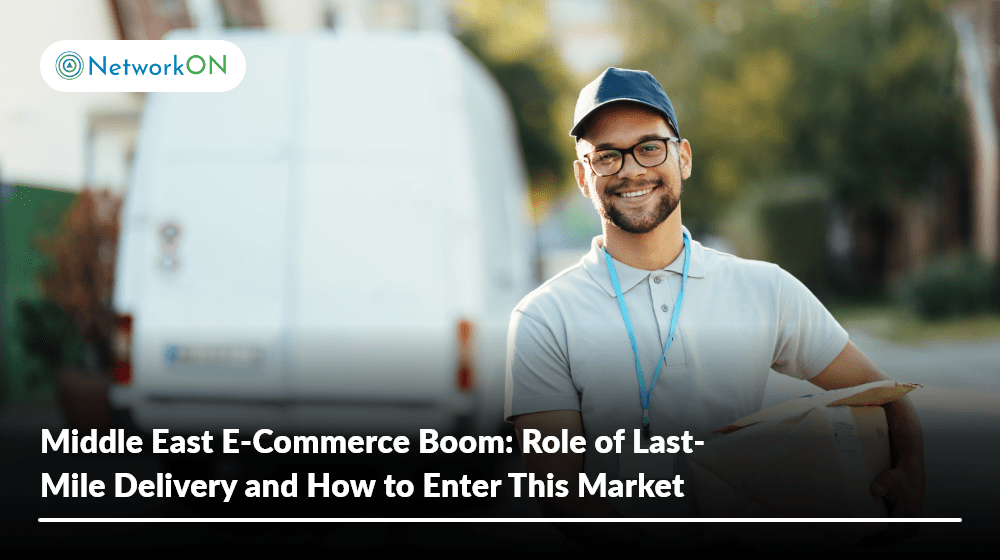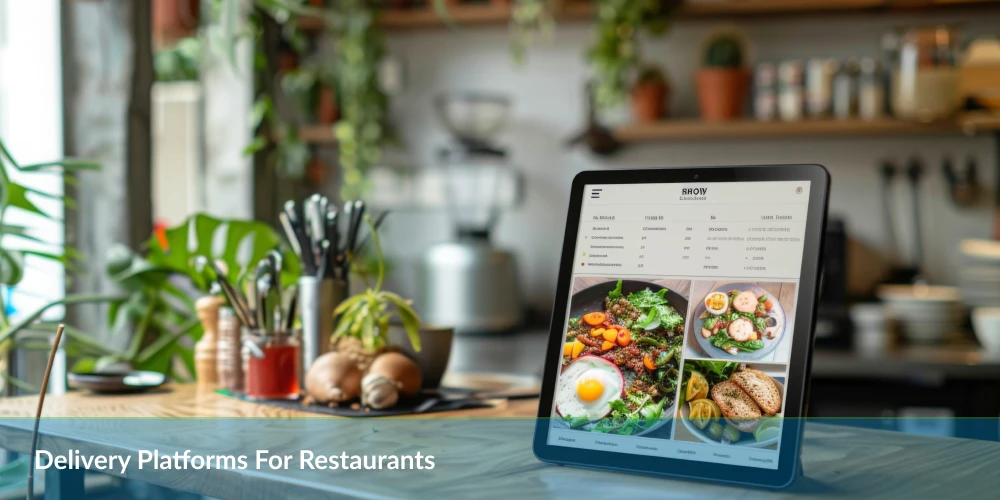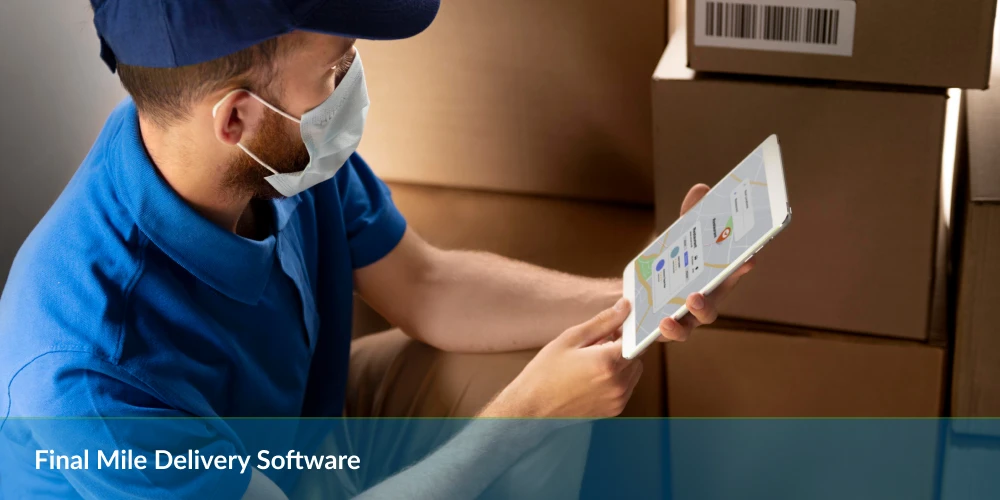Table of Contents
The Middle East has a growing online shopping business, and it has everything needed for success. With its good location, business-friendly rules, and great facilities, it’s the perfect place for online shopping to do well.
More and more people in the Middle East are using the internet and smartphones, and they like shopping in an easy and flexible way. The Middle East e-commerce industry is experiencing rapid growth, driven by increasing internet penetration and changing consumer preferences. As a result, there is a growing need for improved last-mile delivery solutions to support this booming Middle East e-commerce market.
- What are the most promising market trends right now
- How easily you can sell your stuff online
- Last-mile delivery problems you might face during deliveries
- Craft last-mile strategies that work the best
Before discussing the E-commerce boom and last-mile delivery challenges in the Middle East, let’s look at the big trends that make a difference in online shopping.

Emerging Patterns in the E-commerce Landscape of the Middle East
Whether you’re delving into the Middle Eastern e-commerce scene or are already an active participant, staying abreast of the prevailing trends is crucial. A comprehensive understanding of market dynamics provides valuable insights into strategic decision-making. Here are six trends that are likely to influence the Middle Eastern e-commerce sector:
Emphasis on E-commerce, B2C, and D2C Retail by Logistics Companies
The logistics landscape in the UAE has evolved into a mature industry primarily geared towards B2B operations. The infrastructure and operations within this sector have traditionally supported large-scale activities and substantial inventory volumes. However, there is a noticeable shift as many logistics companies now focus on B2C operations, catering to smaller-sized shipments using advanced last-mile delivery solutions.
To tap into the B2C market, logistics firms are incorporating technology such as order and inventory management systems and delivery management solutions. This strategic move encourages existing B2B clients to explore D2C retail channels like e-commerce and facilitates efficient inventory management for smaller orders.
Leading companies like Transcorp, a prominent player in the UAE’s logistics and transportation sector, offer customized solutions aligned with their customer’s specific B2B or B2C requirements.
Social Commerce Unleashing Potential Growth
The increase in social media users presents a vast landscape of opportunities for businesses seeking to leverage social and messaging channels for marketing and sales. The digital market’s expansion is evident as social and conversational commerce platforms in the UAE secure funding to enhance their market presence.
Furthermore, even traditional offline retailers without a digital footprint adapt by listing products on platforms such as Facebook and Snapchat and conducting transactions via WhatsApp.
Surge in Demand for International Products
The trend of purchasing from foreign businesses is gaining traction in the Middle East. Many online shoppers in the UAE prefer making purchases through overseas vendors, attracted by enhanced gateway security and reliable, free shipping options.
Beyond these statistics, cross-border e-commerce in the Middle East holds immense potential, fueled by its diverse population and the convergence of cultures, including expatriates and the workforce from various countries.
Omnichannel Integration on the Rise in the Middle East
Despite the growing prominence of online consumption, the Middle East remains renowned for its physical shopping centres and stores, indicating the enduring popularity of offline shopping. In response, regional retailers are adopting omnichannel strategies to blend virtual and physical shopping experiences for customers seamlessly.
Buy Now, Pay Later (BNPL) Gains Significant Traction
Tamara, a leading payments innovator in the MENA region, reports a substantial increase in average order value in the Middle East attributed to Buy Now, Pay Later (BNPL) payments.
BNPL has become a highly sought-after and convenient payment option, applicable to various purchases, from electronics to medicines, food, or groceries. Unlike the traditional Cash-On-Delivery (COD) method, BNPL allows buyers to test products before making payments, providing security. Additionally, this payment method alleviates retailers’ burden of collecting payments upon delivery.

Primary E-commerce Sales Channels in the Middle East
E-commerce Marketplaces play a significant role in catering to online consumers across various regions in the Middle East. Notable platforms include:
Amazon: Operating in the UAE, Saudi Arabia, and other Middle Eastern parts, Amazon’s marketplace attracts over 20 million visits monthly. Previously dominated by Souq marketplaces in the UAE and Saudi Arabia, Amazon acquired them in 2017, establishing itself as a prominent marketplace.
Noon: This homegrown marketplace operates across countries such as the UAE, Saudi Arabia, and Egypt, drawing in more than 15 million monthly visits from these regions.
Namshi.com: Focused on fashion, apparel, and diverse product categories, Namshi.com records approximately 2 million visits monthly. While most of its e-commerce net sales are generated in the UAE, Saudi Arabia contributes significantly.
Instashop: Headquartered in Dubai, Instashop serves as the leading online marketplace for supermarkets, pharmacies, pet shops, and other businesses in the Middle East. The platform boasts over 180 thousand visits per month.
Leading Last-Mile Carriers for E-commerce in the Middle East
As the e-commerce industry expands, the demand for efficient last-mile carriers and third-party logistics providers (3PLs) is rising. Here are some top choices for last-mile delivery and related services:
- Emirates Post: Official parcel delivery service in the UAE, facilitating global and GCC e-commerce parcel movement. Offers 3-5 days of door-to-door transit, same-day, and next-day domestic delivery. Provides warehouse management and fulfilment services in Dubai South.
- Shyft: Licensed e-commerce carrier under Emirates Post with 1,250+ partners, a 4.8 customer rating, 94% delivery success, and 95% on-time delivery. Serves various industries with reliable Cash on Delivery (COD) facilities.
- J&T Express: Comprehensive services, including express delivery, warehousing, and supply chain solutions. With 290+ distribution centres, 1,000 sorting equipment, and a vast network, J&T Express ensures efficient last-mile delivery for local and global customers.
- Transcorp: Leading smart cold-chain solutions provider in the UAE. Specializes in last-mile, warehousing, and leasing solutions, delivering 100,000+ parcels monthly with strong relationships with 150+ business partners.
- Saudi Post: Saudi Arabia’s government-operated postal system offers three last-mile delivery options: shipping to doorsteps, locks, and postal offices. Provides Cash on Delivery (COD) solutions and reverse logistics services across the Kingdom.
- Aramex: Emirati multinational logistics and courier company, offering international shipping and last-mile courier services. Supports businesses with e-commerce solutions, supply chain management, and technical logistics support.
- SMSA Express: Leading carrier in Saudi Arabia providing international and domestic express transportation, customs clearance, e-commerce solutions, and special delivery channel services. Offers diverse and cost-effective options for organizations and governmental entities.
- DHL: DHL Express in the MENA region serves multiple countries, providing last-mile courier services. Facilitates local and international shipping, regardless of parcel size, with main hubs in Dubai and Bahrain.
Challenges Facing the E-commerce Industry in the Middle East
As with any growing industry, the Middle Eastern e-commerce sector encounters specific challenges that impact last-mile delivery. Here are some noteworthy obstacles:
- Dominance of Offline Retail: Despite the increasing growth of the e-commerce market in the UAE, offline retail remains the preferred choice for consumers. To attract online shoppers, businesses must differentiate by offering unique incentives such as discounts, special offers, or exceptionally convenient services.
- High Cost of Human Resources: Managing inventory and orders requires human involvement, leading to increased operational costs. Training staff can result in delays and additional expenses, while human errors further contribute to elevated costs in the e-commerce business processes.
- Limited Awareness of Technology Solutions: Although various e-commerce technology solutions are available in the Middle East, the absence of local providers limits awareness among e-commerce and logistics businesses. This lack of knowledge about the latest technology solutions challenges optimizing operational efficiency.
- Reliance on Cash on Delivery (COD): Many online shoppers in the Middle East still opt for Cash on Delivery (COD) payments instead of online payment methods. The reliance on COD presents challenges, as receiving payments through delivery partners takes time, affecting the overall business cycle.
Tips for Success in Middle Eastern E-commerce
The Middle East holds significant potential for e-commerce, and taking swift action to address industry challenges can provide a first-mover advantage. Industry experts offer the following tips for success:
Leverage Last-Mile Technology
To overcome manual operations and digitize your business, embrace technology. Utilize technology to seamlessly integrate multiple marketplaces with your e-commerce ecosystem, provide real-time tracking and insights, expedite order fulfilment, and establish connections with reliable logistics partners.
By adopting robust last-mile delivery solutions that integrate well with existing systems, you can simplify your e-commerce operations. Tailor your technology choices based on your business type:
- For brands, retailers, distributors, or e-commerce enablers, focus on technology that ensures digital health monitoring, control over catalogue distribution, effective management of third-party and grey sellers, and proactive suggestions for enhancing customer experience and sales.
- For 3PL, 4PL, or logistics providers catering to both B2B and B2C, select technology consolidating parcel and carrier management, supporting scalability and additional services, and providing accurate real-time customer reporting.
When choosing technology for your online retail business, aim to streamline backend operations, navigate multiple sales channels effortlessly, and gain insights into your and your competitors’ performance.
As an e-commerce logistics company, prioritize technology beyond basic storage and delivery services, focusing on improving customer experience, onboarding processes, and delivering faster service.
Understand Government Policies
The UAE aims to transition into a cashless society, aligning with its vision to cultivate a digital culture and remove obstacles hindering this objective. Emphasizing cashless payments and digital commerce, the government, in line with the UAE Vision 2021, has implemented pro-business policies to encourage the growth of digital retail.
Staying informed about and complying with these policies is crucial for success in the Middle Eastern e-commerce landscape.
Partner with Companies that Add Value
In a market saturated with retail businesses, differentiation is challenging. To stand out, it is essential to collaborate with partners that bring tangible value to your business. Seek partnerships that complement your strengths, whether through technology integration, unique offerings, or enhanced customer experiences.
Prioritize Quality Logistics Services Over Prices
When selecting a logistics partner, prioritize service quality over cost considerations. The fulfilment and delivery quality levels significantly influence customer satisfaction in the Middle East. Opt for logistics providers that consistently deliver high-quality services to leave a positive and lasting impression on your customers.
Speak the Local Language
Address language barriers by tailoring your communication to the local language of your target audience. Incorporating Arabic into your communication is crucial in regions like KSA or Saudi Arabia, where Arabic is predominant.
Since most Middle Eastern people speak Arabic, localizing content involves more than just language; it includes using local imagery, measurement systems, currencies, and aligning with cultural preferences and values.
In last-mile logistics, adopting a localized approach ensures that resources interacting with customers in the Middle East understand and embody the Arabic culture, becoming the face of your business in the region. Integrating these details into your product content and brand helps establish a deeper connection with consumers in the Middle East.
The Promise of Cross-Border Expansion into the Middle Eastern E-commerce Market
If you’re considering expanding your business into the Middle East, understanding the potential of this market is crucial. Here are a few things to remember:
The benefits of venturing into the Middle Eastern e-commerce industry include the following:
Easy Availability of Last-Mile Delivery Logistics Services
Local logistics players in the Middle East are actively gearing up for e-commerce, making logistics services readily available. These businesses are adopting integrated Inventory and Warehouse Management technology to handle smaller quantity orders for clients efficiently.
Sufficient Room for New Brands
The Middle East has a reputation for retail product distribution, offering the potential for manufacturers from other markets to enter. By conducting thorough research on product demand, supply gaps, and competitor analysis, businesses can determine if their products can successfully penetrate the Middle Eastern e-commerce industry.
Availability of E-commerce Technology
E-commerce Software as a Service (SaaS) technology is readily available in the Middle East, providing the necessary platforms to manage e-commerce and logistics. Partnering with technology solution companies, such as NetworkON, offers local support from experts familiar with the market.
Their insights, customized tech applications, and integrations for the Middle Eastern region enable businesses to stay ahead and focus on core business strategies. Businesses can easily list products in the Middle Eastern e-commerce market through an order management system with diverse integrations, connecting inventory to local platforms and logistics companies.
Free Trade Zones for Foreign Businesses
The UAE boasts over 40 multidisciplinary free zones, where companies can operate with exemptions from various taxes such as value-added tax (VAT), income tax, corporate tax, and customs. These zones provide foreign businesses, including expatriates and investors, the advantage of full ownership of their companies.
Key Takeaways
1. Middle East e-commerce is booming, driven by high internet penetration, widespread smartphone usage, and a young, tech-savvy population.
2. Efficient last-mile delivery is critical for success in the rapidly growing online shopping industry across the region.
3. Logistics companies are pivoting towards B2C operations to meet the increasing demand for smaller, more frequent deliveries.
4. Social commerce is gaining significant traction, with businesses leveraging platforms like Facebook, Snapchat, and WhatsApp for marketing and sales.
5. There’s a surge in demand for international products, presenting opportunities for cross-border e-commerce.
6. Omnichannel integration is rising, with retailers blending online and offline experiences to meet diverse consumer preferences.
7. Key e-commerce marketplaces like Amazon, Noon, Namshi, and Instashop dominate the Middle Eastern online retail landscape.
8. Businesses entering the Middle East e-commerce market should prioritize localization, mobile optimization, and partnerships with local logistics providers.
9. The adoption of advanced technologies, such as AI-powered last-mile delivery solutions, is crucial for optimizing operations and enhancing customer experience.
10. Understanding local regulations, payment preferences, and cultural nuances is essential for successful market entry and expansion in the Middle East e-commerce sector.
Before You Make a Move, Make Sure You’re Ready
This article covers various aspects of the Middle Eastern e-commerce industry, including current trends, top marketplaces, the status of last-mile logistics providers, and more. Additionally, tips for success in the Middle East and the potential of nearby Asian markets have been highlighted. Regardless of the chosen expansion destination, ensure you:
- Thoroughly research to understand the market and its customers.
- Partner with businesses to leverage local services, connections, and market knowledge.
- Prepare for challenges that may arise during expansion.
- Utilize e-commerce technology, such as NetworkON, to simplify last-mile delivery operations.
If you’re looking to grow your business in the Middle East, these considerations will help you successfully navigate the complexities of entering foreign online markets.
You will also need access to a round delivery management system that can streamline the logistics arm of your business. NetworkON is a robust, out-of-the-box solution that can help you navigate the complexities of establishing and maintaining delivery operations from the ground up.
So, whether you are a new business looking to set up its operations or an existing business that needs to scale up its logistics processes, NetworkON is your perfect partner.
To learn more about NetworkON, email us at info@networkon.io or visit our website today.
Frequently Asked Questions
What is driving the E-Commerce boom in the Middle East?
The Middle East E-Commerce boom is primarily fueled by increasing internet penetration, rising smartphone usage, and a growing young population with a preference for online shopping. Additionally, the COVID-19 pandemic has accelerated the adoption of online retail in the region.
How crucial is the role of Last-Mile Delivery in the Middle East E-Commerce market?
Last-mile delivery plays a pivotal role in the success of E-Commerce in the Middle East. Given the diverse geography and varying consumer expectations, efficient and reliable last-mile delivery solutions are essential to meet customer demands, enhance customer satisfaction, and establish a competitive edge in the market.
What challenges do businesses face in entering the Middle East E-Commerce market?
Entering the Middle East E-Commerce market presents challenges such as understanding cultural nuances, adapting to diverse regulatory environments, establishing reliable logistics and last-mile delivery networks, and addressing payment preferences. Successful market entry requires a comprehensive understanding of these factors.
How can businesses optimize their Last-Mile Delivery strategies in the Middle East?
Optimizing Last-Mile Delivery in the Middle East involves leveraging advanced technology, collaborating with local delivery partners, employing data analytics for route optimization, and ensuring a customer-centric approach. Companies need to tailor their strategies to the unique demands and infrastructural considerations of each country in the region.
What are the key considerations for developing a successful E-Commerce platform in the Middle East?
Developing a successful E-Commerce platform in the Middle East requires localization, offering multiple payment options, integrating language support, and ensuring a user-friendly mobile experience. Adapting to the preferences and habits of the local consumer base is essential for sustained growth.
How are regulatory factors influencing the Middle East’s e-commerce landscape?
Regulatory factors in the Middle East, including data protection laws, taxation policies, and import regulations, significantly impact E-Commerce operations. Businesses must stay abreast of evolving regulatory frameworks and work closely with local authorities to ensure compliance and mitigate potential risks.





Zencortex reviews
This website is an absolute gem! The content is incredibly well-researched, engaging, and valuable. I particularly enjoyed the [specific section] which provided unique insights I haven't found elsewhere. Keep up the amazing work!